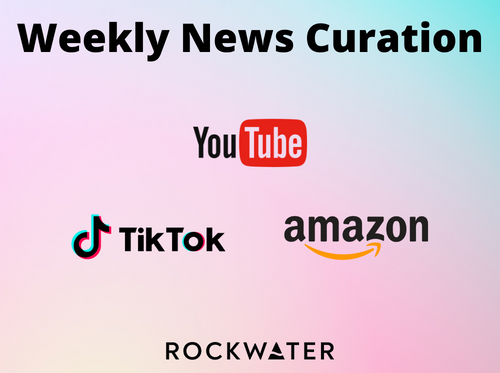What do Bob Iger and Vince McMahon Have in Common?
What We’re Reading
2 articles + RockWater analysis to make you a better investor and operator. Today we discuss the year of the “founder-CEO” comeback, and Temu’s (a subsidiary of Pinduoduo) expansion within the U.S. e-commerce market.
———
Vince McMahon, Bob Iger, and Katrina Lake Make Their Homecoming Debut
WallStreet Journal, 01.06.2023
The RockWater Take by Chris Erwin
On Friday Vince McMahon reappointed himself to WWE board to kick-off an M&A sales process, and hired JP Morgan as advisor. Stock up 24% since Friday’s news. Vince believes there’s a limited and unique window to exit biz at premium due to growth of live x sports rights values being paid by #media co’s and #streamers, and that flagship properties like “Raw” and “Smackdown” are about to be renegotiated, so the timing must be now.
Last Thursday Stitch Fix founder Katrina Lake announced return as CEO, after company cut 20% of salaried jobs. Stock up 24%. Previous CEO was 18 months into role. Katrina will finish out remaining 6 month term and seek out successor. Will focus on creating a leaner, more nimble org and return to profitability. Builds upon large layoffs and distribution center shut down.
On Nov 20 Bob Iger orchestrated ouster of previously-hired replacement Bob Chapek, so he could return as CEO of The Walt Disney Company. Stock immediately jumped 8%, but since then is now only trading 3% above previous levels. The company and street lauded the move, saying needs incl (1) better investor relations and expections mgmt (2) increased focus on profitability (3) increased focus on powering creative decision-making and retaining top talent relationships as differentiator.
My quick POV on these moves, speaking in general terms and not just about these 3 specific announcements…
😉 2023 is all about “back to basics”. And founders help teams return to the orginal biz focus and sensibility to what led to success in the 1st place. Can be a positive morale boost, which matters a lot in down economy
😉 Boards seek to “shake things up” while stock prices in the dumps, and hopes to assign blame to past moves / leadership, ie “oops we made a mistake, but now fixed!” But realistically, I question if new CEOs can meaningful change strategy
😉 Brings helpful PR buzz to any new initiative, like WWE’s planned sale
😉 Were old CEOs ever setup for success? In Disney case, I don’t think so based on what I’ve read…that WSJ article highlights Iger as quite the political manipulator!
Some questions worth looking into…
👉 What other examples am I missing?
👉 Is this trend consistent during economic downturns, say compared to 2008 and 2001?
👉 How successful are “return CEOs” in identifying successors?
👉 Do “return CEOs” often deliver better results?
Curious to reader input here. Pls comment below with any insights!
———
The PDD is Largely Slept on by Western Media, Despite Being One of the Most Innovative Ecom
Marketplace Pulse, 10.28.2022
The RockWater Take by Michael Booth
Resurfacing my thoughts from September on Temu (Pinduoduo’s US ecommerce app). Since my blog post it has reached a $1.5M GMV run rate and is #3 in the iOS app store. 👇🏼👇🏼
All of this success despite a quiet launch and minimal marketing spend. Temu is now rolling out paid P2P referrals (one of the key features PDD used to leapfrog Chinese ecom incumbents), this is one of many features from the PDD playbook I expect Temu rolls out shortly (team shopping to come next?). US ecom marketplaces should be on high alert — PDD executed a similar playbook in China and meteorically grew its market share. Also, curious what this signals for other foreign ecom marketplaces trying to build traction in US ( Coupang, Rakuten, etc).
Background context from my last post on PDD & Temu:
PDD is largely slept on by western media, despite being one of the most innovative ecom platforms.
Launched in 2015 as a D2C produce market, by 2017 PDD was turning $15B in GMV, flash forward to present day and PDD did $350B of GMV last year. Now the second largest Chinese ecom platform behind Alibaba Group.
PDD’s unique selling proposition can be summed up as Costco meets Disneyworld. A highly gamified discount shopping experience that is starkly different than anything available in the west.
PDD has direct partnerships with thousands of factories throughout China and effectively sells D2C wholesale.
PDD’s secret sauce is its compound growth user acquisition funnel. PDD invented a concept called “team shopping”. Effectively, this means users buy everyday items and receive discounts of up to 90% by inviting friends to join their team and buy them as well. Users could join existing teams in the app, but prices were even lower if users started their own team. Team shopping became so popular that being a PDD team manager is a common side hustle in China.
The UX for assembling teams is frictionless, as PDD is built as a direct integration into WeChat. Once PDD entered a new region in China, it spread peer-to-peer like a wildfire.
So, what does this mean for the US ecom landscape?
Time will tell. The US hasn’t developed super apps like China, so PDD can’t just lift & shift its UA playbook to reach the same scale in the US. And even if it could, consumer behavior is very different – TBD if US consumers want a highly gamified ecom interface.
PDD’s US launch has been quiet – it’s branded under a different name (Temu), there hasn’t been a big marketing push, and many of its core gamification features have been stripped. Team shopping not yet rolled out.
That said, PDD is a very cash rich company and has started seeing diminishing growth in China. I’d be surprised if they don’t have much bigger plans for the US that are yet to be announced.
Temu is probably PDD’s V1.0 market entry to gather data, test, and adjust.

———
If these insights are relevant to projects you’re working on, ping us here. We love talking all things media / tech / commerce!



